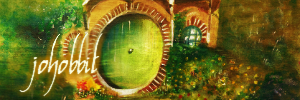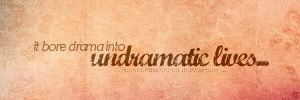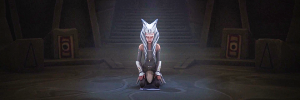I am completely mystified by the way this works. I tried to reply, it asked me if I wanted to save the draft or something of that sort, and I hit yes, and now nothing's there anymore.  Anyway, here's the post again.
Anyway, here's the post again.
I thought it would be appropriate to post some quotes on George MacDonald by C.S. Lewis and G.K. Chesterton. First, from Suprised by Joy on the reading of Phantastes:
It is as if I were carried sleeping across the frontier, or as if I had died in the old country and could never remember how I came alive in the new... I did not yet know (and I was long in learning) the name of the new quality, the bright shadow, that rested on the travels of Anodos. I do now. It was Holiness... There was no temptation to confuse the scenes of the tale with the light that rested upon them, or to suppose that they were put forward as realities, or even to dream that if they had been realities and I could reach the woods where Anodos journeyed I should thereby come a step nearer to my desire... Thus, when the great moments came I did not break away from the woods and cottages that I read of to seek some bodiless light, shining beyond them... For I now perceived that while the air of the new region made all my erotic and magical perversions of Joy look like sordid trumpery, it had no such disenchanting power over the bread upon the table or the coals in the grate. That was the marvel. Up till now each visitation of Joy had left the common world momentarily a desert.... Even when real clouds or trees had been the material of the vision, they had been so only by reminding me of another world; and I did not like the return to ours. But now I saw the bright shadow coming out of the book into the real world and resting there, transforming all common things and yet itself unchanged.
And by G.K. Chesterton:
Certain magazines have symposiums (I will call them 'symposia' if I am allowed to call the two separate South Kensington collections 'musea') in which persons are asked to name 'Books that have Influenced Me', on the lines of 'Hymns that have Helped Me'. It is not a very realistic process as a rule, for our minds are mostly a vast uncatalogued library; and for a man to be photographed with one of the books in his hand generally means at best that he has chosen at random, and at worst that he is posing for effect. But in a certain rather special sense I for one can really testify to a book that has made a difference to my whole existence, which helped me to see things in a certain way from the start; a vision of things which even so real a revolution as a change of religious allegiance has substantially only crowned and confirmed. Of all the stories I have read, including even all the novels of the same novelist, it remains the most real, the most realistic, in the exact sense of the phrase the most like life. It is called
, and is by George MacDonald, the man who is the subject of this book. When I say it is like life, what I mean is this. It describes a little princess living in a castle in the mountains which is perpetually undermined, so to speak, by subterranean demons who sometimes come up through the cellars. She climbs up the castle stairways to the nursery or the other rooms; but now and again the stairs do not lead to the usual landings, but to a new room she has never seen before, and cannot generally find again. Here a good great-grandmother, who is a sort of fairy godmother, is perpetually spinning and speaking words of understanding and encouragement. When I read it as a child, I felt that the whole thing was happening inside a real human house, not essentially unlike the house I was living in, which also had staircases and rooms and cellars. This is where the fairy-tale differed from many other fairy-tales; above all, this is where the philosophy differed from many other philosophies. I have always felt a certain insufficiency about the ideal of Progress, even of the best sort which is a Pilgrim's Progress. It hardly suggests how near both the best and the worst things are to us from the first; even perhaps especially at the first. And though like every other sane person I value and revere the ordinary fairy-tale of the miller's third son who set out to seek his fortune (a form which MacDonald himself followed in the sequel called
), the very suggestion of travelling to a far-off fairyland, which is the soul of it, prevents it from achieving this particular purpose of making all the ordinary staircases and doors and windows into magical things. Dr. Greville MacDonald, in his intensely interesting memoir of his father which follows, has I think mentioned somewhere his sense of the strange symbolism of stairs. Another recurrent image in his romances was a great white horse; the father of the princess had one, and there was another in
. To this day I can never see a big white horse in the street without a sudden sense of indescribable things. But for the moment I am speaking of what may emphatically be called the presence of household gods - and household goblins. And the picture of life in this parable is not only truer than the image of a journey like that of the Pilgrim's Progress, it is even truer than the mere image of a siege like that of The Holy War. There is - something not only imaginative but intimately true about the idea of the goblins being below the house and capable of besieging it from the cellars When the evil things besieging us do appear, they do not appear outside but inside. Anyhow, that simple image of a house that is our home, that is rightly loved as our home, but of which we hardly know the best or the worst, and must always wait for the one and watch against the other, has always remained in my mind as something singularly solid and unanswerable; and was more corroborated than corrected when I came to give a more definite name to the lady watching over us from the turret, and perhaps to take a more practical view of the goblins under the floor. Since I first read that story some five alternative philosophies of the universe have come to our colleges out of Germany, blowing through the world like the east wind. But for me that castle is still standing in the mountains and the light in its tower is not put out. All George MacDonald's other stories, interesting and suggestive in their several ways, seem to be illustrations and even disguises of that one I say disguises, for this is the very important difference between his sort of mystery and mere allegory. The commonplace allegory takes what it regards as the commonplaces or conventions necessary to ordinary men and women, and tries to make them pleasant or picturesque by dressing them up as princesses or goblins or good fairies. But George MacDonald did really believe that people were princesses and goblins and good fairies, and he dressed them up as ordinary men and women. The fairy-tale was the inside of the ordinary story and not the outside. One result of this is that all the inanimate objects that are the stage properties of the story retain that nameless glamour which they have in a literal fairy-tale. The staircase in
is as much of a magic ladder as the staircase in the ; and when the boys are making the boat and the girl is reciting verses to them, in , and some old gentleman says playfully that it will rise to song like a magic Scandinavian ship, it always seemed to me as if he were describing the reality, apart from the appearance, of the incident. The novels as novels are uneven, but as fairy-tales they are extraordinarily consistent. He never for a moment loses his own inner thread that runs through the patchwork, and it is the thread that the fairy great-grandmother put into the hands of Curdie to guide him out of the mazes of the goblins.
[...]I make no attempt here to fix his place in literature. He is in any case one of the kind that it is most difficult to fix. He wrote nothing empty; but he wrote much that is rather too full, and of which the appreciation depends rather on a sympathy with the substance than on the first sight of the form. As a matter of fact, the mystics have not often been men of letters in the finished and almost professional sense. A thoughtful man will now find more to think about in Vaughan or Crashaw than in Milton, but he will also find more to criticize; and nobody need deny that in the ordinary sense a casual reader may wish there was less of Blake and more of Keats. But even this allowance must not be exaggerated; and it is in exactly the same sense in which we pity a man who has missed the whole of Keats or Milton, that we can feel compassion for the critic who has not walked in the forest of Phantastes or made the acquaintance of Mr. Cupples in the adventures of Alec Forbes.
I don't have quotes from Tolkien, but basically he loved The Princess and the Goblin and At the Back of the North Wind as a child, and confessed to drawing from the former as the only fairy-tale work that influenced The Hobbit. In preparing for his lecture On Fairy Stories he drew heavily from The Golden Key, but he later came to despise it as he did most Victorian work. Ironically, Smith of Wootton Major began as an idea for the preface of that story. He also strongly disliked Phantastes. Especially he criticized MacDonald for being incoherent, moralizing, and allegorical despite some memorable passages.

I love those quotes from Chesterton. Makes me want to reread The Princess and the Goblin.
~~~~~
"You never really understand a person until you consider things from his point of view... Until you climb inside of his skin and walk around in it."
~~~~~
Please note that this SF will be closing on Thursday evening.

Signature by Narnian_Badger, thanks! (2013)
7,237 posts from Forum 1.0
Wow, Mel. That animated "Princess and the Goblin" looks-interesting.  I don't think I'll ever be watching that . . .
I don't think I'll ever be watching that . . .  I wish someone would try a live action The Princess and the Goblin. They could make it such a magical tale!
I wish someone would try a live action The Princess and the Goblin. They could make it such a magical tale! 
Oh dear, you make me (and those of my ilk) sound so villainous here.
Ah, but of course. That was the point. 
 I do hope you give it another try eventually. And I want to hear all about it, when you do. . .
I do hope you give it another try eventually. And I want to hear all about it, when you do. . .
Those quotes are lovely, Phosphorus! 
Speaking of how much Lewis respected MacDonald, and drew some of his ideas into The Chronicles and other books, a quote Decarus posted in a game today made me think of this.
'Wouldn't it be dreadful if some day in our own world, at home, men started going wild inside, like the animals here, and still looked like men, so that you'd never know which were which?'

I think the key word in your sentence about a live action Princess and the Goblin is 'could', DTR. Do you suppose they could make the last word plural while they're at it? 

Those quotes are lovely, Phosphorus!

Ditto! 
Interesting parallel! I seem to remember noticing it in passing last time I read TPaC, but there might have been another one...
We have hands that fashion and heads that know,
But our hearts we lost - how long ago! -- G. K. Chesterton


